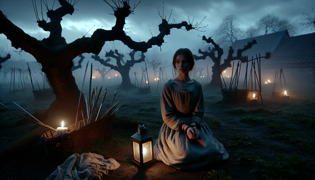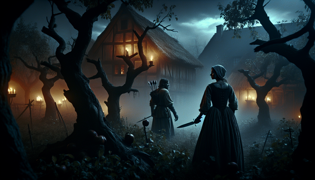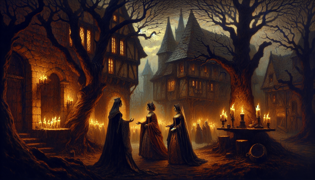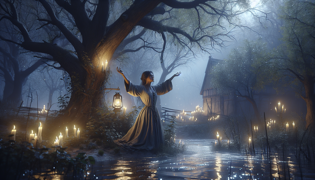The Girl Without Hands: A Tale of Perseverance and Redemption
Reading Time: 10 min

About Story: The Girl Without Hands (The Armless Maiden) is a from germany set in the . This tale explores themes of and is suitable for . It offers insights. A tale addressing domestic abuse and incest.
Introduction
A low moon hovered behind ragged clouds above the miller’s cottage, casting wavering beams over sodden thatch and twisted ivy. Inside, a single lantern flickered on the rough-hewn table, its glow trembling on the anxious face of the miller’s daughter. Each breath she drew seemed burdened by the old stone walls and the furtive sounds of her father counting coins in the next room. He had come to a terrible bargain with an otherworldly figure—a pact that would turn life’s grain into grief if his daughter did not surrender what she cherished most: her hands.
Through the narrow window, the orchard lay in muted silhouette—gnarled branches like desiccated hands grasping at the slate sky. There, the maiden had once gathered ripened apples for the family’s meager supper. Now the prospect of stepping beneath those limbs brought dread: she knew the stranger would demand the price be paid in flesh and blood. Her heart pounded like millstones grinding corn, threatening to spill secrets she could not undo.
In a hush, the front door creaked open. Her father’s boots clattered, and in the dim glow she saw him flinch, lantern in hand, as if he too feared what was to follow. All around, shadows lengthened, merging with fear. Outside, the wind carried the rustling promise of autumn’s chill. Within, a darker promise tickled the edges of the girl’s mind: hope. Perhaps this was the darkness before a dawn no mortal eye had yet witnessed.
She rose on unsteady feet, her bare arms trembling against the cold. The lantern’s light fell upon her small hands—hands that would soon be gone—and she closed her eyes, summoning courage from the whisper of orchard winds. Beyond these walls lay a journey through sorrow and betrayal, but ahead also glimmered a chance at something unimaginable: redemption’s soft glow in a world that had forgotten mercy.
A Bargain Sealed in Blood
The miller’s cottage smelled of damp straw and old flour. In the small room, the stranger—tall, dark-cloaked, eyes like burning embers—waited. The miller, cheeks flushed with wine and desperation, pressed wrinkled parchment into trembling fingers.
“Sign here,” the visitor rasped, voice like wind through dead reeds. The miller did, feverishly. In exchange, his mills would turn golden grain without toil, and wealth beyond imagining would pour into his pockets. But the final clause—the price—remained unspoken until the ink had dried.
That night, his daughter awoke to a guttural thump. In the lantern’s flicker, she saw him advancing—knife in hand—toward the sleeping stranger. With each footstep, her heart hammered. She sensed a dreadful demand.Forced from her bed, she followed as her father led her to the orchard. Moonlight glinted off his blade. Under the skeletal limbs of ancient trees, the devil awaited, arms folded. The girl’s hands shook free of their bindings.
“Your father owes a soul,” the being said softly, voice like distant thunder. “He offers you.”
She trembled but did not cry—refusing to give him that gift. Then, with surgical precision, the blade descended. Blood blossomed across her white dress. She did not scream but turned her face to the sky, whispering, “Make me whole again.”
When it was done, the devil vanished. The orchard lay silent except for her ragged breaths. Her wrists, now bared of flesh, throbbed like hollow drums. She staggered home, the weight of empty sleeves reminding her with every step that nothing—not hope, not faith—could ever fully sever the bond of remembrance.

The Orchard’s Whispered Kindness
When dawn’s pale fingers crept across the hills, the girl awoke beneath a fallen trunk, her torn gown damp with dew. She touched the hollow ends of her arms and felt only emptiness. But within that emptiness stirred something she had never known: fierce determination.
She rose on trembling knees and walked into the orchard’s heart, drawn by the scent of rotting apples and mossy bark. There, she found rows of gnarled apple trees stretching to a mist-shrouded river. She crouched by the water, cupped her stumps, and let the cold current slip through her wounds. A soft mist rose from the stream, as though the land itself mourned her pain.
As she sat, a faint melody teased her ears—an otherworldly hush woven into the sighing breeze. The orchard seemed alive, branches brushing like comforting hands. She closed her eyes and let tears mingle with river water, and each tear felt like a small prayer for healing.
Then, as if in answer, a cloaked stranger emerged from the silvery haze. He moved with gentle grace—his robes pale as moonlit silk—and his presence was neither threatening nor benign but suffused with something ancient. He knelt and pressed a palm to the stones, murmuring in a tongue older than the oldest oak.
Minutes stretched like hours until, at last, he spoke: “Your name?”
She whispered, “Elisabeth.”
He nodded, retrieving a small crystal vial from beneath his cloak. Inside swirled liquid like molten starlight. “Drink,” he said.
With trembling fingers, she brought the vial to her lips. The liquid was cool as morning mist, and a subtle warmth spread through her body. Pain flickered but dimmed, replaced by a curious numbness. She lowered the vial and felt new flesh tenderly knitting around nerve and bone.
Her heart soared as she flexed her regenerated hands. For a moment, she marveled at the simple wonder of touch. Yet as dawn fully broke, the stranger vanished, leaving only footprints in the damp earth and a faint echo of that ancient song.
Elisabeth crept home through the orchard’s hush, each step reaffirming her rebirth. Though her father’s cottage lay in ruin and the world beyond held danger, she carried within her a spark—a conviction that no pact, no cruelty, could ever extinguish her will to live.

Beneath the King’s Haunted Halls
Word of the handless maiden’s miraculous survival spread like wildfire. One crisp morning, a royal messenger arrived, bearing an ornate scroll sealed with wax. It invited Elisabeth to the king’s castle, promising shelter and favor. Though she sensed hidden motives, she accepted—drawn by the possibility of a new beginning.
The castle loomed above a blackened moat, stone ramparts crowned with ivy. Torches flared in iron sconces as she passed through the massive oak gates. The courtyard bustled with courtiers in brocade and velvet, their laughter echoing off marble. Elisabeth, clad in a simple grey dress now clean and mended, felt out of place among jewels and silk.
The king himself was a gaunt figure, crowned with curious silver hair and eyes that glowed like polished steel. He addressed her in a voice both commanding and eerily gentle. “You have endured what none could survive. In you burns a spirit I cannot resist.” His gaze lingered on her newly healed hands.
Elisabeth curtsied, uncertain of her words. “Your Majesty, I am grateful for your kindness.”
Kindness turned to obsession. The king summoned her each night into his private chambers, where candlelight danced on tapestries of hunts and banquets. He spoke of destiny and union, his words weaving a tapestry of promises tinged with something darker.
In the servants’ wing, whispers told of his three daughters—each more beautiful than the last—who had caught no such favor. Jealousy poisoned their hearts. One night, they confronted Elisabeth in the moonlit gallery, accusing her of witchcraft. “She bewitched us to win his love!” they hissed.
Terror seared her chest, but Elisabeth stood firm. “I seek only shelter and the chance to repay kindness.”
Their rage frothed. They seized her by the wrists and dragged her to a hidden staircase leading to a deserted tower. There they left her bound and starving, convinced the king would never miss her.
Alone in that silent tower, Elisabeth felt the old terror whisper beneath her new skin. Yet as hunger gnawed, a fierce ember kindled in her heart. She would not perish in darkness. She freed one hand, then the other, using grit and sheer will. Each narrow corridor she traversed was another stride toward reclaiming her destiny.

Rivers of Restoration
Under cover of night, Elisabeth slipped from the tower and fled through twisting corridors. She reached the ancient bridge over the same river that had first healed her. Torches flickered from battlements overhead, but no guard challenged her passage.
On the starlit bank, she knelt once more in the chill of the current. Her heart pounded as she whispered, “If mercy still lives, grant me strength.” She pushed her sleeves above her elbows, exposing the faint scars where new flesh had formed.
The water swirled around her arms and there came a humming—soft as a lullaby—echoing the orchard’s distant song. Stars mirrored in the ripples, and she felt warmth blossom from elbow to fingertip. Tender flesh sprouted like spring buds until her hands lay whole and pulsing with life.
Tears blurred her vision, not of sorrow but of triumph. Elisabeth rose, cradling her restored arms. Behind her, a dark shape emerged. The king, cloak billowing, stood on the bridge’s edge. His eyes softened as he beheld her transformation.
“You have proven more than I ever imagined,” he murmured. “Will you share my throne?”
She met his gaze with steady grace. “My journey has taught me that true power lies not in courts or crowns, but in the courage to endure.”
The king lowered his head. “Then rule by my side as equal and sovereign.”
In the weeks that followed, justice was served. The jealous princesses were stripped of title and banished to humble cloisters. The miller, broken by guilt and years of sorrow, knelt before Elisabeth in the courtyard. With tears, he begged forgiveness. She embraced him, her gentle hands guiding him back to hope.
Under their rule, the kingdom prospered. Orchards bloomed and mills ground grain once more by honest labor. Lanterns burned brightly in every cottage window, a pledge that no shadow—however dark—could ever eclipse light for long.

Conclusion
When dawn broke on the kingdom, Elisabeth walked through orchard groves turned lush and fragrant. The once barren trees now bore fruit heavier than any harvest before. The people, many who had known only shadows, gathered in open courtyards to celebrate a new era of compassion and justice. She moved among them, touching hands without fear, each palm a testament to her journey.
At the palace gate, the king awaited, crown removed, cloak dropped to reveal a battered but humbled man. He bowed, asking forgiveness not as a king to a subject, but as a father to a daughter restored. Elisabeth smiled, her own heart finally at peace, and they embraced—two souls freed from the binds of regret.
In time, they wed beneath boughs of apple blossoms, vows spoken in sunlight and laughter. From that day forward, the kingdom knew no more bargains with darkness. Instead, it thrived on honesty, kindness, and the unbreakable spirit of a handless maiden who refused to be broken.
Thus, the tale of the Girl Without Hands passed into legend: a story whispering across generations that no act of cruelty—no matter how savage—can extinguish the light of perseverance. In every tear shed, in every wound endured, there lives the seed of renewal, and from the deepest night, the dawn will always come.

















